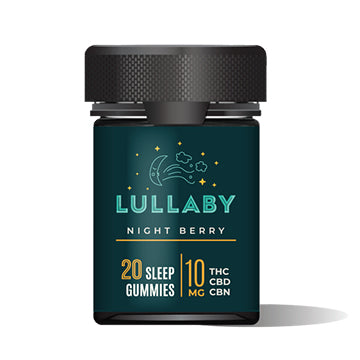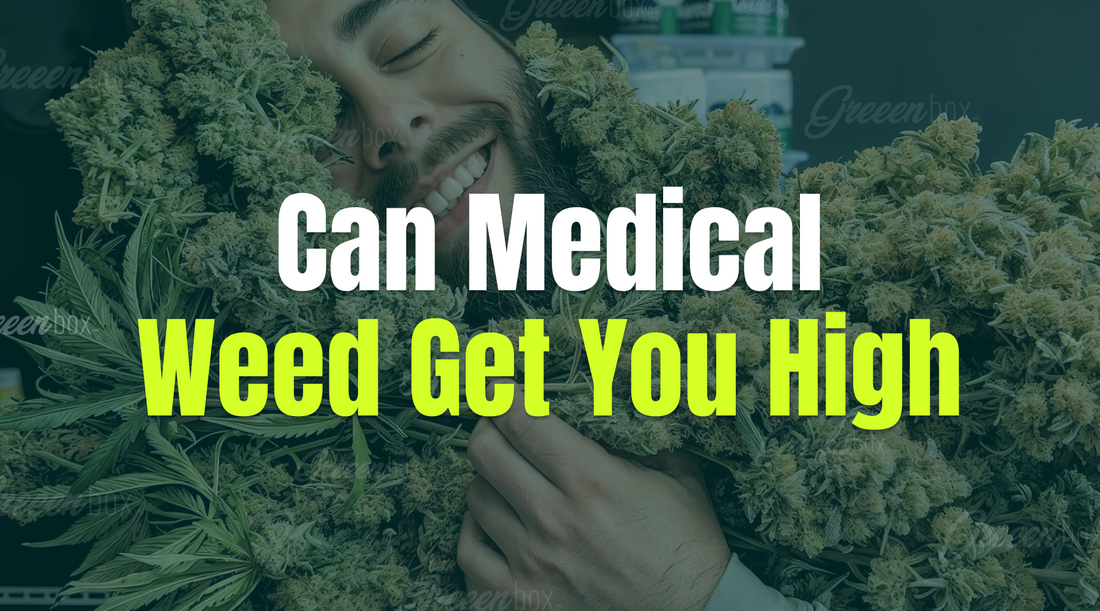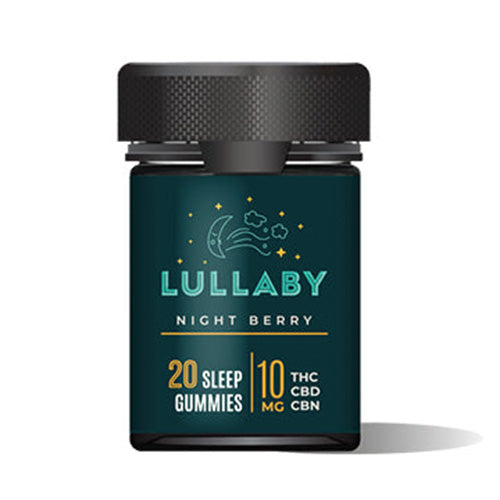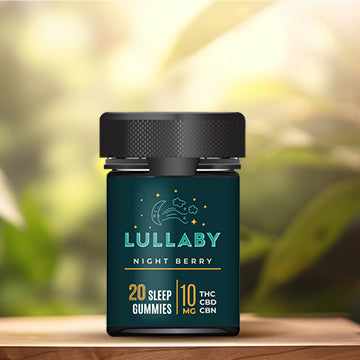If you're considering medical cannabis for health conditions, you probably have questions about its effects on your mind and body. One of the most common concerns is whether medical type will get you high.
Before we get deeper into the specific effects and considerations of medical cannabis, it's important to note that this information focuses solely on cannabis prescribed for medical purposes under proper healthcare supervision. Understanding both the therapeutic benefits and potential psychoactive effects will help you make informed decisions about your treatment options.

Flower of the Month Subscription
|

Lullaby Sleep Gummy Night Berry
|

GreeenBox Subscription
|
Does Medical Weed Get You High?
Understanding Medical Cannabis Options
Medical cannabis contains over 100 different cannabinoids, with CBD and THC being the primary compounds used in medicine. While THC produces psychoactive effects, CBD offers therapeutic benefits without the high.
Key factors affecting your experience include:
- The CBD to THC ratio
- Product formulation
- Delivery method
- Individual body chemistry
- Treatment goals
Read more: Does Quitting Smoking Weed Make You Lose Your Appetite?
How Does It Work
THC's effects on your body start within minutes or hours, depending on how you consume it. When you take medical cannabis or infused medicine, THC enters your bloodstream through your lungs almost immediately. This quick absorption often results in noticeable effects within 5-10 minutes.
The strength of these effects depends heavily on the THC concentration in your medical. Higher THC levels typically mean stronger psychoactive effects. Your personal factors also play a crucial role - things like:
- Your previous experience with weed
- Your body weight and metabolism
- Your overall health condition
- Your sensitivity to THC
- The specific strain you're using
Even experienced users notice that their reactions can vary significantly based on these factors.
Consumption Methods and Their Effects
Understanding different consumption methods helps you predict and control the intensity of psychoactive effects. Each method delivers THC to your body differently, resulting in varying onset times and duration of effects.
Edibles and Oils
Edible forms of medical weed take longer to produce effects - usually 30 minutes to 2 hours - but the effects can last 6-8 hours. The delayed onset often leads new users to consume more than intended, so careful dosing is essential. The liver processes THC from edibles differently, converting it to a more potent form that can create stronger and longer-lasting effects.
Tinctures and Sprays
Sublingual methods (under the tongue) offer a middle ground. Effects typically begin within 15-45 minutes and last 2-6 hours. These methods allow for more precise dosing and discretion.
Topicals
Topical applications like creams and patches typically don't cause psychoactive effects. They work locally and rarely enter the bloodstream in significant amounts, making them ideal for patients seeking pain relief without the high.
Read more: Does Smoking Weed Cause Depression?
Therapeutic Benefits vs. Psychoactive Effects
The relationship between medical benefits and the "high" from weed is complex. While some patients find the psychoactive effects helpful for their overall treatment, others prefer to minimize these effects while maximizing therapeutic benefits.
Medical Benefits Without the High
Many patients seek medical weed primarily for its therapeutic properties:
- Pain reduction
- Nausea control
- Muscle spasm relief
- Sleep improvement
- Appetite stimulation
Recent research indicates that certain medical benefits don't require intense psychoactive effects. Many recreational users exploring different products through monthly weed boxes are now also becoming interested in low-THC, high-CBD options for their therapeutic properties.
When the High Helps
For some conditions, the psychoactive effects actually contribute to the therapeutic benefits:
- Anxiety reduction
- PTSD symptom management
- Depression treatment
- Chronic pain management
- Sleep disorders
Studies show that patients experiencing both the medical benefits and psychoactive effects often report better overall outcomes. The euphoria and altered perception can help break cycles of negative thoughts and pain patterns.
Managing Side Effects
While exploring treatment options, patients often report various Immediate side effects:
- Short-term memory changes
- Coordination challenges
- Increased heart rate
- Dry mouth
- Red eyes
These effects vary in intensity based on dosage and consumption method. Many patients who receive weed sub boxes report learning to better manage these effects by experimenting with different strains and consumption methods included in their monthly deliveries.
Finding Your Balance
Every patient's response to medical cannabis differs. What works well for one person might not suit another. Key factors to consider:
- Start with low doses
- Track your responses
- Communicate with healthcare providers
- Monitor both benefits and side effects
- Adjust the timing of use based on daily activities
Regular users often develop personal strategies for maximizing benefits while minimizing unwanted effects. This might involve timing doses, choosing specific strains, or adjusting consumption methods based on daily activities and responsibilities.
Read more: Does Smoking Weed Cause Hair Loss?
Long-Term Considerations and Effects
Understanding the long-term impact of it helps you make informed decisions about your treatment plan. Whether you're a patient starting treatment or someone exploring options through monthly weed boxes, knowing what to expect over time is crucial.
Cognitive Function Over Time
Regular medical weed use can affect cognitive functions in several ways:
Memory and Learning:
- Short-term memory changes may persist
- Information processing speed might decrease
- Learning new tasks could take longer
- Attention span might require more management
However, these effects often improve after reducing or stopping use. Many patients develop strategies to maintain cognitive function while continuing treatment.
Tolerance Development
Your body naturally adjusts to regular use of it:
- Higher doses may be needed for the same effects
- Psychoactive effects often decrease over time
- Medical benefits might require dose adjustments
- Tolerance can develop differently for different effects
Understanding Dependency Risks
While less addictive than many prescription medications, weed can lead to dependence:
Physical Aspects:
- Sleep pattern changes
- Appetite fluctuations
- Mood variations
- Minor withdrawal symptoms
Psychological Aspects:
- Habitual use patterns
- Reliance for stress management
- Difficulty reducing use
- Social routine changes
Read more: What Happens To Your Body When You Stop Smoking Weed?
Sustainable Use Strategies
Developing a sustainable long-term plan involves several key practices:
Regular Assessment:
- Monitor effectiveness
- Track side effects
- Evaluate quality of life impact
- Adjust treatment plans as needed
Lifestyle Integration:
- Maintain regular activities
- Balance treatment with responsibilities
- Plan usage timing carefully
- Keep open communication with healthcare providers
Risk Reduction:
- Use appropriate dosing
- Choose quality products
- Maintain health check-ups
- Stay informed about research
Support Systems:
- Medical supervision
- Family understanding
- Patient community connections
- Educational resources
Financial Planning
Long-term medical cannabis use requires financial planning:
- Insurance rarely covers costs
- Regular purchases add up
- Quality products matter
- Budget management is essential
Some patients find that weed sub boxes help manage costs by providing regular supplies and avoiding impulse purchases.
Read more: Does Smoking Weed Make You Lose Weight?
Making Smart Decisions
Medical weed’s ability to produce psychoactive effects is an important consideration in your treatment journey. While the "high" is a reality of THC-containing products, understanding how to manage and optimize these effects can lead to better treatment outcomes.
For those interested in exploring different consumption methods and products, weed boxes provide a structured way to discover what works best. Greeen Box delivers premium accessories, curated products, and exciting discoveries right to your door every month. Join our community of conscious consumers who value quality, variety, and convenience.



